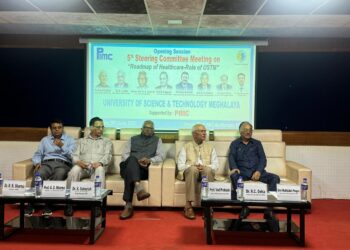The University of Science and Technology Meghalaya (USTM) has recently established the Jahanara and Anwar Saikia Centre for Peace Studies, dedicated to peace research and studies in the northeastern region of India and its diverse communities. The inauguration took place on Saturday, led by Prof. Gauri Dutt Sharma, Vice Chancellor of USTM, and Prof. Yasmin Saikia, the Hardt-Nickachos Chair in Peace Studies at Arizona State University, USA. The Centre is named in honor of Prof. Yasmin Saikia’s parents.
Prof. Saikia has generously contributed Rs 1 crore to USTM for the development of the Peace Centre, with USTM providing the land for its construction. The Centre aims to become a hub of excellence in peace research and studies among ASEAN countries.
USTM Chancellor M. Hoque expressed profound gratitude to Prof. Saikia and her family for their voluntary sponsorship of the Centre. Prof. Yasmin Saikia will serve as the Founding Director, with Dr. Trishna M. Thakuria as the Coordinator.
During the inauguration, Prof. G.D. Sharma conveyed his confidence in the Centre’s potential to enhance USTM’s global competitiveness. He thanked Prof. Yasmin Saikia for her noble initiative and significant support in establishing this institution.
Prof. Yasmin Saikia shared insights from her experiences at leading US universities, suggesting best practices to make the Centre a hub of excellence in education, research, and innovation, aiming for a positive social impact. She emphasized that USTM will focus intensively on peace research and studies through this fully-fledged Centre, the foundation for which was laid last year on the University campus.
It is well recognized that peace studies are highly relevant and urgently needed in today’s climate of increasing unrest and intolerance, both locally and globally. Establishing a center dedicated to peace studies can play a crucial role in uniting stakeholders through collaborative efforts, working together to promote and achieve peace.
Prof. Yasmin Saikia, holding the Hardt-Nickachos Chair in Peace Studies at the Center for the Study of Religion and Conflict and a professorship in history at the School of Historical, Philosophical and Religious Studies, focuses her work on the histories of memory and identity, women, war, and peace, and the histories of premodern and contemporary South Asia. She examines Muslim experiences in India, Pakistan, and Bangladesh, exploring the discourse of nonviolence and the practice of violence against women and vulnerable groups. Her approach to peace studies integrates cultural, historical, and individual and group agency perspectives, aiming to advance the study of peace through a humanities-oriented lens.









